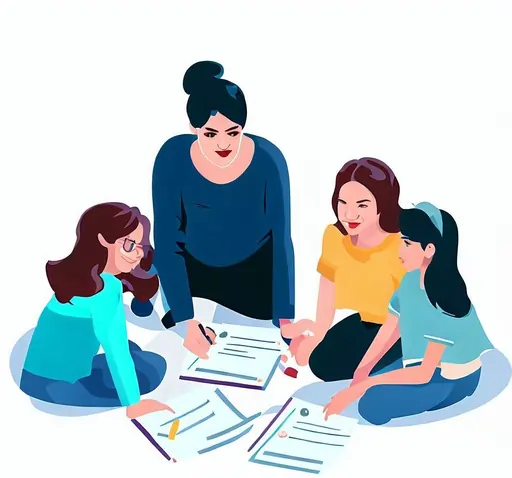Guide to Work on Group Homework on Oracle - Learning and Working Effectively as Part of a Team


A successful team environment depends on developing trust and resolving conflicts. A successful collaboration is facilitated by fostering a supportive culture, resolving conflicts early on, and using mediation when necessary. Collaborative learning, in addition to teamwork, is crucial for maximizing the advantages of group homework. Knowledge acquisition and critical thinking are promoted by regular knowledge-sharing sessions and collaborative documentation. Establishing a project timeline, keeping the team accountable, and conducting regular check-ins and status updates are the final steps in maximizing productivity and coordination. By using these techniques, you can get the most out of your group homework on Oracle and improve your teamwork abilities in preparation for future tasks and pay someone to do your oracle homework
Understanding the Importance of Teamwork in Oracle Homework
When completing group homework in Oracle, cooperation is crucial. Each team member brings different abilities, viewpoints, and expertise to the table, which can result in creative solutions and a deeper comprehension of the subject. However, effective teamwork necessitates coordination, effective communication, and a common goal. Establishing open and transparent channels of communication allows team members to share insights, exchange ideas, and respond quickly to any problems or issues. In order to divide tasks efficiently, meet deadlines, and advance the project as a whole smoothly, coordination is essential. Team members can coordinate their efforts toward a common objective and collaborate effectively when they have a shared vision. The promotion of a supportive and collaborative environment where ideas can be freely exchanged, helpful criticism is encouraged, and people can learn from one another occurs when teamwork is prioritized in Oracle homework. The ability to use the team's strengths to overcome challenges, increase productivity, and complete Oracle group homework successfully is where the value of teamwork ultimately lies. Three crucial areas are listed below.
Establishing Open and Clear Communication Channels
- Utilize Communication Tools: To facilitate communication, pick a suitable channel, such as email, IM apps, or project management software. Make sure that everyone on the team has access to and is familiar with the chosen tool. Tools for effective communication enable efficient information sharing and teamwork.
- Set Communication Guidelines: Set standards for the frequency of updates, timeliness of responses, and communication style. To avoid misunderstandings or delays, clearly state your expectations. Communication that is organized and constant throughout the project guarantees that everyone is informed and on the same page.
- Encourage Active Participation: Establish a setting that encourages active participation from all team members. Encourage everyone to offer suggestions, pose queries, and offer criticism. Collaboration, different viewpoints, and the generation of creative solutions are all facilitated by active participation.
Defining Roles and Responsibilities
- Identify Individual Strengths: Find out what each team member excels at, then assign roles to them. For instance, one person might be an expert at SQL queries while another might be skilled at database design. Utilizing individual strengths increases productivity and unlocks the full potential of the team.
- Delegate Tasks Fairly: Consider the abilities of each person and their capacity for workload when allocating tasks. Make sure that everyone feels ownership and responsibility for the tasks they have been given. A balanced workload is encouraged by fair task distribution, which also fosters a sense of teamwork and shared responsibility.
- Establish Deadlines: To maintain a smooth workflow, establish precise deadlines for each task. Continually check in with team members to monitor progress and provide help as necessary. Deadlines that are clearly defined aid in time management and guarantee project completion on schedule.
Building Trust and Resolving Conflicts
- Foster a Supportive Environment: Promote a supportive environment where team members can respectfully and freely express their opinions. Encourage cooperation and respect for the opinions of all team members. Trust, honest communication, and respect for one another are fostered in a nurturing environment.
- Address Conflicts Proactively: Group projects may result in conflicts. It's crucial to respond to them quickly and constructively. Encourage honest communication, attentive listening, and, if necessary, compromise. Proactively resolving conflicts improves team dynamics and stops conflicts from growing.
- Seek Mediation if Required: When disputes linger or worsen, think about bringing in a third party to mediate the matter, like a professor or project manager. Effective conflict resolution and team harmony are the results of mediation because it offers an unbiased perspective and encourages productive discussions.
Effective Strategies for Collaborative Learning on Oracle Homework
Learning in groups can hasten the process of gaining knowledge, encourage critical thought, and improve problem-solving abilities. To maximize the advantages of group work when it comes to Oracle homework, effective strategies for collaborative learning are crucial. Team members can share concepts, clear up questions, and exchange ideas by holding regular knowledge-sharing sessions. This interactive method promotes participation and a deeper comprehension of Oracle. Additionally essential to group learning are collaborative documentation and note-taking. Team members can collectively compile notes, share resources, and record significant findings by using shared platforms for documentation, such as Google Docs or Microsoft Teams. By dividing and conquering the workload, the team can conduct in-depth research and documentation on all project-related topics. These techniques enable team members to build on each other's strengths, question presumptions, and come up with original solutions through collaborative learning on Oracle homework. It fosters a culture of continuous learning where team members can deepen their understanding of Oracle concepts and practices, hone their analytical abilities, and broaden their knowledge. Here are two methods for promoting group learning in the context of Oracle group homework:
Regular Knowledge-Sharing Sessions
- Organize Group Discussions: Plan frequent group discussions to share knowledge, dispel confusion, and exchange ideas. Use this chance to share knowledge, show off your skills, and learn from one another. Team members can contribute their perspectives and broaden their understanding of Oracle through group discussions, which promote a collaborative learning environment.
- Rotate the Role of the Presenter: Each time a discussion session takes place, designate one team member to present a particular subject or idea. This strategy promotes participation and aids in developing a deeper understanding of Oracle. Each team member has the chance to improve their presentation skills, conduct in-depth research on a specific topic, and impart their knowledge to the other team members by rotating in the role of presenter.
Collaborative Documentation and Note-taking
- Shared Documentation Platforms: Create a shared document using online collaboration tools like Google Docs or Microsoft Teams so that the team can pool its notes, resources, and significant discoveries. Real-time collaboration is made possible by these platforms, allowing team members to simultaneously add to, edit, and access information.
- Divide and Conquer: Distribute the workload among the team members as you conduct research and write up various project components. Make sure that the information is organized and coherently consolidated. By breaking up the work, the team can concentrate on particular topics, conduct in-depth research, and record their findings. This teamwork approach ensures thorough project coverage and promotes effective knowledge sharing among team members.
Maximizing Productivity and Coordination
It is essential to put strategies that streamline workflow and improve team performance into place to ensure effective coordination and maximum productivity. Team members can effectively coordinate their efforts and monitor progress by establishing clear communication channels, defining roles and responsibilities, and setting up a project timeline with specific milestones. Accountability is maintained through regular check-ins and status updates, which also present chances to address problems or offer support. Creating an environment of accountability within the team makes sure that everyone is committed to staying on task, meeting deadlines, and finishing the project on time. Utilizing collaborative tools and technologies, such as shared document platforms or project management software, can also improve coordination and facilitate easy teamwork. Teams working on Oracle homework can ensure a smoother workflow, reduce conflicts, and maximize their combined efforts to achieve successful results by maximizing productivity and coordination. The following tactics are listed:
Establishing a Project Timeline and Milestones
- Define Project Scope: The project's goals, objectives, and deliverables should be clearly stated. Make a timeline with clear milestones and divide the work up into smaller tasks. Clarifying the project's scope makes it clear what needs to be accomplished, and breaking it down into doable tasks enables better resource allocation and planning. Setting milestones makes it easier to monitor development and keeps the project on schedule.
- Track Progress: Review the project's progress and the progress of each team member on a regular basis. Determine any potential bottlenecks or areas that need more assistance and deal with them right away. By monitoring development, you can evaluate the project's status, make necessary adjustments, and make sure that deadlines are met. Additionally, it aids in spotting any potential problems or risks and makes it possible to take preventative action to lessen them.
Regular Check-ins and Status Updates
- Conduct Regular Team Meetings: Plan regular meetings to evaluate progress, address problems, and coordinate strategies. These meetings can also be used to discuss upcoming deadlines and give updates on tasks that have been completed. Regular team meetings encourage collaboration, transparency, and open communication. They make it possible for information exchange, problem-solving, and prompt resolution of any issues or worries.
- Foster Accountability: Motivate team members to hold one another accountable for keeping commitments and completing tasks on time. This shared responsibility makes sure that everyone is committed to the project's success and keeps their attention on it. Team members are more likely to take ownership of their tasks, adhere to deadlines, and produce high-quality work when an environment of accountability is promoted. Additionally, it strengthens the team's overall collaboration and teamwork and helps to develop trust within the group.
Conclusion
In conclusion, when approached with effective teamwork strategies, working on group homework related to Oracle can be a rewarding and enriching experience. You can promote a collaborative environment that maximizes learning and productivity by establishing clear communication channels, defining roles, and developing trust within the team. Your group's efficiency will increase and a smooth workflow will be created if you promote frequent knowledge-sharing sessions, cooperative documentation, and coordinated project management. It's crucial to keep in mind that effective group work on Oracle homework entails more than just achieving the desired result; it also involves acquiring useful teamwork skills that will benefit all of your future endeavors. Adopting these techniques improves your knowledge of Oracle while also developing crucial abilities like collaboration, communication, and problem-solving. So, embrace the benefits of teamwork, make the most of your teammates' skills, and aim for excellence when completing your Oracle group homework.